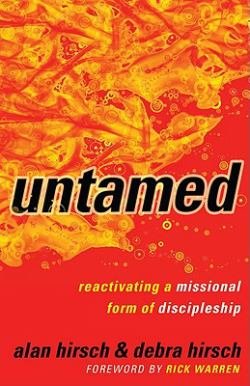What kind of images come to mind when you think of a deacon? A godly person who applies the gospel to everyday life, serves their community and lives on mission? Probably not. Unfortunately, many of our deacon images are distorted by poor church practice. You might think of a seedy old guy who is out of touch with culture and in touch with his hunger for power. Or perhaps you think of a guy in a black suit with a name tag riding a bicycle around town? Or maybe you just don’t have a clue! And what’s up with the word “deacon” any way? Why not use a less stuffy title?
What is a Deacon?
I’d like to rescue those sinking deacon images and place then on the firm, dry ground of Scripture. The Bible tells us that deacons are people who “gain good standing for themselves†and “confidence in Christ!†Good standing and confidence in Christ are something all Christians should desire. Like the office of elder, the office of deacon is worthy of aspiration. It is leadership in the most important community on the planet, the church of Jesus Christ. So what is a deacon?
The word for deacon is used in John 2:9 to refer to wedding servants who serve wine (bar tenders?). This text shows us a generic use of “deaconâ€, namely that they are servants or that they serve, but all servants aren’t necessarily deacons. In Philippians 1:1 and Acts 6:1-4, we discover that “deaconâ€Â can also refer to a particular church office, a leadership role in the church. In Acts 6, the apostles appointed deacons to take care of various church tasks so that the apostles/elders could devote themselves to the Word of God and to prayer.
Now, this doesn’t mean, of course, that deacons don’t study, teach, or preach the Word of God or that they refrain from prayer. Not at all. What it does mean, however, is that they focus on service in order to free elders/pastors to devote themselves to theological and prayerful leadership. You might say that deacons are Lead Servants in practical ministry.
What Should a Deacon Do?
 So we’ve established what a deacon is—a qualified Lead Servant. Now what does a deacon do? What does he or she lead? A deacon leads various ministries in a church. He leads in the church. Now, remember that the church is not a lifeless institution; it is an organic, growing community. The church is a missional community. It grows in depth and number. It was in this kind of missional growth that deacons were first appointed. Acts 6 tells us that while the “disciples were increasing in number” the apostles appointed the very first deacons. People were coming to faith and joining the church on its mission. As the church grew, they needed people to step up and lead in service.
So we’ve established what a deacon is—a qualified Lead Servant. Now what does a deacon do? What does he or she lead? A deacon leads various ministries in a church. He leads in the church. Now, remember that the church is not a lifeless institution; it is an organic, growing community. The church is a missional community. It grows in depth and number. It was in this kind of missional growth that deacons were first appointed. Acts 6 tells us that while the “disciples were increasing in number” the apostles appointed the very first deacons. People were coming to faith and joining the church on its mission. As the church grew, they needed people to step up and lead in service.
There are two primary contexts for service in the Missional Church—the community context and a mission context. There are community-focused deacons and mission-focused deacons. Community focused deacons serve the church of mission, and mission-focused deacons serve the mission of the church. Both are critical to the overall health and mission of the church. Both have roles that change and roles that stay the same. For the sake of brevity, I’ll keep my comments to mission-focused deacons.
Community focused deacons serve the church of mission, and mission-focused deacons serve the mission of the church.
Mission-focused Deacons
Mission focused deacons often fulfill changing roles with a changing culture. For example, in the Ephesian church there were deacons who were responsible for leading out in ministry to widows and orphans. In 1 Timothy chapter 4, Paul devotes an entire chapter to the treatment of widows. The care of widows is not as pressing in affluent American culture. Paul was responding to a particular need in the Ephesian historical moment.
While all churches should pay attention to the needs of widows and orphans (e. g. nursing homes, adoption, and children’s shelters), many churches in the U.S face different missional needs. That same need is not as pressing in some churches. As the historical church advances and retreats throughout history, moving from continent to continent, culture to culture, the expression of the church varies. As a result, there are some areas of service that remain the same and others that change.
Varying cultural contexts require new diaconate expressions in order for the church to faithfully engage in its mission.
When I was in Eastern Uganda last year, I met deacons who oversee land development to feed the community. In U.S. cities, there is no land to be developed. What we may need are deacons of story-telling and media to promote the gospel or deacons to serve transient and homeless populations. In our church, we are raising up deacons to lead out in urban renewal through efforts like Music for the City and ReNew. Varying cultural contexts require new pathways of service in order for the church to faithfully engage in its mission to redemptively engage peoples and cultures. In short, mission-focused deacon roles should change.
Gospel-motivated Deacons
Hopefully we’ve rescued any tarnished, sinking image of deacon from your experience and placed it on good, biblical ground. Perhaps too good? You might be saying to yourself: “This is so demanding. Why would I want to be a deacon? How could I possibly do this?†Paul addresses in 1 Tim 3:13: “For those who serve well as deacons gain a good standing for themselves and also great confidence in the faith that is in Christ Jesus.†There are two related reasons–gaining good standing and great confidence. Sounds a lot like a self-esteem boost. What’s Paul getting at?
To gain a “good standing”, literally “a stepâ€, is to gain influence and reputation. Well, you say, isn’t that narcissitic? Well, it depends what your reputation says: “Hey, look how spiritual I am†then yes. But if your reputation says: “Hey, look how great Christ isâ€, then no. There’s a difference between the person who climbs the corporate ladder stepping on people all the way up only to get to the top to boast as though they never had a hand, and the person who moves up the ladder acknowledging every hand on the way up, topping the ladder only to point to all the help they had in getting there. The one with the bad reputation says: “Look how great I am†but the one with the good reputation says: “Look how great my help is.†He glorifies the help.
A deacon puts himself in a place where he has to rely on Jesus more, and the more he relies on Jesus, the more reliable Jesus proves to be.
This is why Paul also says deacons gain “great confidence in the faith that is in Christ Jesus.†Why great confidence? Because the deacon puts himself in a place where he has to rely on Jesus more, and the more we rely on Jesus the more reliable he proves to be. And the more reliable he proves to be the more confident we become in Him. A deacon gains good standing, not merely because he serves, but because he serves in Christ. He knows that the only way he reached his good reputation is because of the help of Christ, because of the gospel. It was his constant reliance on Jesus, his faith in Christ, that moved him along in service. At the end of his life he will look back and say: “Look how great my help was. Look how great Christ is.†He glorifies Christ.
 Ed Stetzer will be presenting on the current state of mission in Austin today. After completing a multi-month research project on the:
Ed Stetzer will be presenting on the current state of mission in Austin today. After completing a multi-month research project on the:
 m getting rocked on discipleship these days. From my positive experiences in the pub, in the projects or in God’s presence to a deepening desire for more disciples, more discipleship, more life sharing on mission. God is using the Hirsch’s book to call me into deeper missional discipleship—making disciples while on mission.
m getting rocked on discipleship these days. From my positive experiences in the pub, in the projects or in God’s presence to a deepening desire for more disciples, more discipleship, more life sharing on mission. God is using the Hirsch’s book to call me into deeper missional discipleship—making disciples while on mission.
 So we’ve established what a deacon is—a qualified Lead Servant. Now what does a deacon do? What does he or she lead? A deacon leads various ministries in a church. He leads in the church. Now, remember that the church is not a lifeless institution; it is an organic, growing community. The church is a missional community. It grows in depth and number. It was in this kind of missional growth that deacons were first appointed. Acts 6 tells us that while the “disciples were increasing in number” the apostles appointed the very first deacons. People were coming to faith and joining the church on its mission. As the church grew, they needed people to step up and lead in service.
So we’ve established what a deacon is—a qualified Lead Servant. Now what does a deacon do? What does he or she lead? A deacon leads various ministries in a church. He leads in the church. Now, remember that the church is not a lifeless institution; it is an organic, growing community. The church is a missional community. It grows in depth and number. It was in this kind of missional growth that deacons were first appointed. Acts 6 tells us that while the “disciples were increasing in number” the apostles appointed the very first deacons. People were coming to faith and joining the church on its mission. As the church grew, they needed people to step up and lead in service.